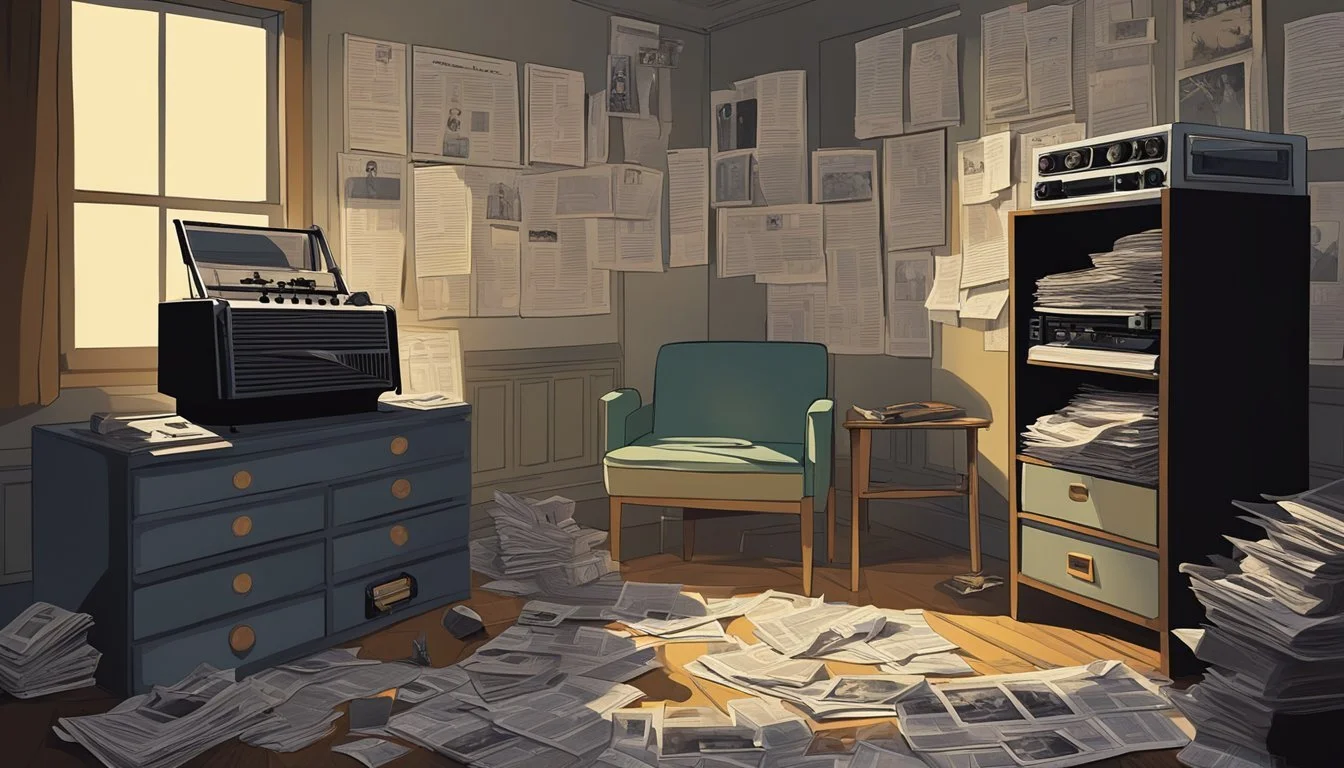Someone Knows Something: The Podcast That Revived Cold Cases on Screen
Exploring True Crime Through Audio Storytelling
Someone Knows Something, the award-winning investigative podcast hosted by filmmaker David Ridgen, has captivated listeners since its debut in 2016. Through meticulous research and compelling storytelling, Ridgen breathes new life into long-forgotten cold cases, offering hope to families seeking closure and justice for their loved ones. The CBC podcast has gained a dedicated following for its sensitive approach to complex investigations and its ability to uncover new leads in decades-old mysteries.
Each season of Someone Knows Something focuses on a different unsolved case, with Ridgen working alongside families, friends, and local communities to piece together fragmented evidence. The podcast's latest season delves into the disappearance of Angel Carlick, a cold case that has haunted Whitehorse for over 15 years. By revisiting these cases with fresh eyes and modern investigative techniques, Ridgen and his team have succeeded in bringing renewed attention to forgotten crimes and, in some instances, prompting official case reviews.
The Impact of 'Someone Knows Something'
'Someone Knows Something' has revolutionized true crime podcasting, breathing new life into cold cases and captivating audiences worldwide. The series has made significant strides in investigative journalism and public engagement with unsolved crimes.
Reviving Cold Cases Through Podcasting
'Someone Knows Something' has become a powerful tool for revisiting unsolved mysteries. By leveraging the podcast format, the show reaches a vast audience, generating renewed interest in forgotten cases. This increased attention often leads to new tips and information from listeners.
The series has successfully reignited investigations in several instances. By presenting detailed accounts and fresh perspectives, it encourages witnesses to come forward with crucial information. This approach has proven effective in cases that had gone cold for years or even decades.
The podcast's impact extends beyond individual cases. It has sparked a broader conversation about the potential of media in solving crimes and the importance of keeping cold cases in the public eye.
The Role of David Ridgen as Host and Investigator
David Ridgen's expertise as both host and investigator is central to the podcast's success. His background in documentary filmmaking brings a unique storytelling approach to each episode. Ridgen's investigative skills allow him to uncover new leads and present complex information clearly.
His empathetic interviewing style creates trust with families of victims and potential witnesses. This approach often results in people sharing information they had previously withheld. Ridgen's dedication to each case is evident, as he frequently spends months or years investigating a single story.
His work has not only advanced investigations but also provided closure to many families. Ridgen's commitment to justice and truth-seeking has made him a respected figure in the true crime community.
The Series' Contribution to True Crime Journalism
'Someone Knows Something' has set a new standard for true crime journalism. The show's in-depth, long-form approach allows for a thorough examination of each case. This contrasts with traditional media coverage, which often provides only surface-level details.
The podcast emphasizes ethical reporting practices, respecting victims and their families. It avoids sensationalism, focusing instead on factual presentation and thoughtful analysis. This approach has helped legitimize true crime as a serious journalistic genre.
The series has inspired other podcasts and media outlets to adopt similar investigative techniques. Its success demonstrates the public's appetite for detailed, responsibly reported true crime stories. As a result, 'Someone Knows Something' has played a key role in elevating the quality of true crime journalism across various media platforms.
In-Depth Case Analyses
"Someone Knows Something" meticulously examines cold cases, uncovering new details and reigniting public interest. Each season focuses on a different unsolved mystery, combining thorough research with compelling storytelling.
Adrien McNaughton: Disappearance and Ongoing Searching
Adrien McNaughton vanished on June 12, 1972, while on a fishing trip with his family in Ontario. He was just 5 years old. The podcast revisits the case, exploring theories about his disappearance.
New leads emerged during the investigation. These included potential sightings and claims of Adrien being alive. The team used advanced technology, including ground-penetrating radar, to search the area.
Interviews with family members and witnesses provided fresh perspectives. The podcast also examined the impact of Adrien's disappearance on the community. Despite extensive efforts, the case remains unsolved.
Sheryl Sheppard: Unraveling a New Year's Mystery
Sheryl Sheppard disappeared on January 2, 1998, shortly after a televised marriage proposal. Her case baffled investigators for years. The podcast delved into the circumstances surrounding her vanishing.
Key aspects of the investigation included:
Analyzing Sheryl's relationships
Examining her last known movements
Exploring potential motives for her disappearance
The series uncovered new information and potential suspects. It also highlighted the challenges faced by investigators in solving cold cases.
Public engagement with the podcast led to new tips and leads. However, Sheryl's fate remains unknown, leaving her family without closure.
Kerrie Brown: Revisiting a Community's Tragedy
Kerrie Brown, a 15-year-old from Thompson, Manitoba, was found murdered in 1986. The podcast reexamined this case that shook a small northern community.
The investigation focused on:
Reconstructing Kerrie's last known movements
Interviewing witnesses and persons of interest
Analyzing physical evidence from the crime scene
New forensic techniques were applied to old evidence. This led to fresh insights into the case. The podcast also explored the impact of Kerrie's death on her family and the community.
Despite renewed interest and investigation, Kerrie's killer remains unidentified. The case continues to haunt Thompson decades later.
Donald Izzett Jr.: A Cross-Border Enigma
Donald Izzett Jr. disappeared in 1995 while traveling in Mexico. The podcast investigated this complex case that spanned two countries.
Key elements of the investigation included:
Tracing Donald's last known contacts
Examining conflicting reports about his whereabouts
Exploring theories about what might have happened to him
The podcast team conducted interviews in both the U.S. and Mexico. They uncovered new information about Donald's activities before his disappearance.
The investigation faced challenges due to the cross-border nature of the case. It highlighted the difficulties in solving international missing persons cases.
Narrative Techniques and Storytelling
"Someone Knows Something" employs powerful storytelling methods to engage listeners and breathe new life into cold cases. The podcast's narrative approach combines investigative journalism with compelling personal stories.
Constructing Compelling True Crime Narratives
The podcast crafts gripping narratives by weaving together interviews, archival material, and expert analysis. Each episode builds tension through careful pacing and reveals new information strategically.
Host David Ridgen's first-person perspective adds immediacy to the storytelling. He shares his thought process and emotional reactions as he uncovers new leads.
The series uses cliffhangers and callbacks to previous episodes to maintain listener interest across the season. This serialized structure encourages binge-listening and deeper engagement with the cases.
Utilizing Episode Transcripts and Multimedia
"Someone Knows Something" enhances its storytelling through multimedia elements. Episode transcripts allow listeners to revisit key details and quotes.
The podcast incorporates audio clips from interviews and archival recordings to bring voices from the past to life. These primary sources lend authenticity to the narrative.
Visual elements on the podcast's website, such as photos of key locations and evidence, help listeners visualize the cases. Interactive timelines and maps provide additional context.
The show's producers carefully edit and mix audio to create atmosphere and emphasize dramatic moments. Music and sound design heighten emotional impact.
Challenges in Cold Case Investigations
Cold case investigations face unique obstacles that require specialized skills and resources to overcome. Detectives must navigate complex legal and procedural hurdles while pursuing new leads in cases that have gone cold for years or even decades.
Finding New Leads in Historical Unsolved Cases
Cold case investigators often start with limited physical evidence and aging witness memories. They must re-examine old case files meticulously, looking for overlooked clues or inconsistencies. Advanced forensic techniques can breathe new life into old evidence. DNA analysis of preserved samples may yield matches in expanded databases.
Detectives leverage social media and public appeals to generate fresh leads. They conduct new interviews with witnesses, hoping time has loosened lips. Cold case units dig through dusty archives and property rooms, seeking misplaced evidence that could crack the case.
Working with Authorities and Legal Challenges
Coordinating with multiple agencies adds complexity to cold case investigations. Detectives must navigate bureaucratic red tape to access old records or evidence held by other jurisdictions. Legal hurdles arise when pursuing suspects years after a crime.
Statutes of limitations may prevent prosecution for some offenses. Investigators work closely with prosecutors to build legally sound cases that can withstand scrutiny. They must carefully manage public expectations, as cold cases often progress slowly.
Budget constraints limit resources for cold case units. Investigators balance cold cases with active investigations, often working cold cases in their spare time. Despite challenges, their persistence brings hope of closure to victims' families and justice for the accused.
Profiles of Featured Cases
Someone Knows Something explores several compelling cold cases, each with unique circumstances and challenges. The podcast sheds light on unsolved mysteries, giving voice to victims and their families.
Angel Carlick's Story: A Quest for Justice in Whitehorse
Angel Carlick, a 19-year-old Indigenous woman, vanished from Whitehorse in 2007. Her remains were discovered six months later in a wooded area. The case shocked the tight-knit Yukon community and remains unsolved.
David Ridgen, the podcast host, works closely with Angel's family and friends to uncover new leads. He examines the circumstances surrounding her disappearance and death, highlighting the broader issue of missing and murdered Indigenous women in Canada.
The investigation explores potential suspects and theories, while also painting a vivid picture of Angel's life and aspirations. Through interviews and archival footage, listeners gain insight into the impact of her loss on the Whitehorse community.
Unraveling the Mystery Around Greavette's Death
Wayne Greavette received a mysterious package containing a flashlight in December 1996. When he turned it on, it exploded, killing him instantly. This bizarre case from Ontario puzzled investigators for years.
The podcast delves into the intricate details of the Greavette case, examining potential motives and suspects. Ridgen interviews family members, witnesses, and law enforcement officials to piece together the events leading up to the fatal explosion.
The investigation uncovers new information about Greavette's personal and professional life, exploring possible connections to organized crime or personal vendettas. The series also highlights the emotional toll on Greavette's family as they continue to seek closure.
CIA Mind Control and Serial Abuse Allegations
This controversial episode explores allegations of CIA-sponsored mind control experiments and serial abuse. The podcast examines claims of covert operations involving psychological manipulation and non-consensual human experimentation.
Ridgen interviews survivors and experts, delving into the history of alleged CIA programs like MKUltra. The investigation raises questions about government accountability and the long-lasting effects of trauma on victims.
The series carefully navigates sensitive topics, providing a platform for survivors to share their experiences while maintaining journalistic integrity. It explores the challenges of investigating decades-old claims and the impact of such allegations on public trust.
The Abortion Wars: Provocative Themes in True Crime
Someone Knows Something tackles the contentious issue of abortion-related violence in this thought-provoking episode. The series examines cases of attacks on abortion providers and clinics, exploring the motivations behind these crimes.
Ridgen interviews both pro-choice and pro-life activists, law enforcement officials, and healthcare providers. The podcast presents a balanced view of the ongoing debate while focusing on specific unsolved cases.
The investigation delves into the historical context of abortion-related violence in North America. It examines the challenges faced by law enforcement in preventing and solving these crimes, as well as the impact on healthcare access and public safety.
The Audience's Role in Solving Crimes
True crime podcasts have transformed audiences from passive listeners to active participants in cold case investigations. This shift has led to breakthroughs and new leads, demonstrating the power of community involvement in solving long-standing mysteries.
How Public Input Aids in Cold Case Breakthroughs
Podcast listeners often provide crucial information that investigators may have missed. Friends and family of victims or suspects frequently come forward with new details after hearing case specifics on a podcast. This fresh input can reignite stalled investigations and point law enforcement in new directions.
Community members sometimes recognize individuals or locations mentioned in episodes, leading to identification of potential suspects or witnesses. The wide reach of podcasts also helps spread information to audiences who may have relevant knowledge about a case but were previously unaware of its details.
Crowdsourcing Information and Community Involvement
Podcasts create virtual communities of amateur sleuths who collaborate to analyze evidence and develop theories. Online forums and social media groups dedicated to specific cases allow listeners to share insights and discuss potential leads.
This collective effort often results in the discovery of overlooked connections or inconsistencies in official narratives. Podcast hosts frequently encourage audience participation by setting up tip lines or email addresses for listeners to submit information.
Some shows actively engage with their audience, following up on promising leads and featuring listener theories in subsequent episodes. This approach keeps cases in the public eye and maintains pressure on authorities to continue investigating.
Behind The Scenes
The creation of "Someone Knows Something" involves meticulous investigative work and collaborative production efforts. David Ridgen's approach and the partnership between Antica Productions and Telltale Industries are key to the podcast's success.
David Ridgen: The Investigator's Methodology
David Ridgen, the host and lead investigator of "Someone Knows Something," employs a thorough and compassionate approach. He delves into cold cases with a keen eye for detail and a deep respect for the victims and their families.
Ridgen's methodology often includes:
Extensive interviews with witnesses and family members
On-site visits to crime scenes
Collaboration with local law enforcement
Careful examination of case files and evidence
His background as a filmmaker helps him craft compelling narratives that engage listeners while maintaining journalistic integrity. Ridgen's work has brought renewed attention to cases like that of Adrien McNaughton, a five-year-old boy who disappeared in 1972.
Production Insights with Antica Productions and Telltale Industries
The partnership between Antica Productions and Telltale Industries brings professional expertise to "Someone Knows Something." These production companies work closely with Ridgen to transform raw investigative material into polished episodes.
Key aspects of their production process include:
Crafting engaging storylines from complex investigations
High-quality audio recording and editing
Fact-checking and legal review of content
Marketing and distribution strategies
The producers often collaborate with journalists and local resource centers to gather additional information. Their work ensures that each episode of "Someone Knows Something" maintains high production values while respecting the sensitive nature of cold cases.
Exploring Broader Themes
Someone Knows Something tackles complex issues beyond individual cases. The podcast sheds light on how crimes affect vulnerable populations and the unique challenges of investigating rural incidents.
Youth and the Vulnerable: Delicate Subjects in Crime Cases
Child welfare workers and youth advocates play a crucial role in protecting at-risk young people. The podcast highlights how struggling youth often become targets of crime. It examines the vulnerabilities that can lead to victimization.
The series explores the responsibilities of youth workers in identifying and reporting potential dangers. It also discusses the challenges of supporting young victims and witnesses through legal processes.
Crime in Remote Areas and the Unique Challenges Faced
Investigating crimes in isolated regions presents distinct obstacles. The Canadian North serves as a backdrop for several cases featured in the podcast. These remote areas often lack resources and face logistical hurdles in evidence collection.
Limited access to forensic technology and specialized personnel can hinder investigations. The podcast examines how tight-knit communities in sparsely populated regions both help and complicate crime-solving efforts.
It also explores the impact of harsh weather conditions and vast distances on law enforcement's ability to respond quickly and effectively to incidents in remote locations.
Cultural Impact and Recognition
"Someone Knows Something" has made significant waves in the true crime genre, captivating audiences worldwide and earning critical acclaim. The podcast's unique approach to cold cases has resonated with listeners and industry professionals alike.
Media Features and Global Attention
The CBC's "Someone Knows Something" has garnered substantial media coverage across various platforms. Major news outlets have featured the podcast, highlighting its innovative storytelling techniques and commitment to justice. The show's global reach extends beyond Canada, attracting listeners from numerous countries.
Social media buzz surrounding each new season has contributed to its growing popularity. Online communities dedicated to discussing the cases presented in the podcast have emerged, fostering engagement and crowdsourcing efforts to aid investigations.
Awards and Acclaims: Valuing True Crime Storytelling
"Someone Knows Something" has received recognition for its exceptional investigative journalism and storytelling. The podcast has been nominated for several prestigious awards in the audio and true crime categories. Its host, David Ridgen, has been praised for his empathetic approach and thorough research.
Industry professionals have lauded the show's production quality and its ability to balance sensitivity with investigative rigor. The podcast's success has inspired similar projects, influencing the landscape of true crime content creation.
Expanding the Series
Someone Knows Something grew beyond its initial scope, attracting a dedicated audience and exploring new formats. The show's evolution included regular releases, related content, and international collaborations.
New Episodes Weekly and the Anticipation Buildup
Someone Knows Something adopted a weekly release schedule, building anticipation among listeners. Each Tuesday, audiences eagerly awaited new installments of the gripping true crime investigations. This consistent schedule allowed viewers to plan their listening habits and fostered a sense of community as fans discussed theories and developments.
The show's producers expertly crafted cliffhangers and teasers, leaving listeners craving more. Social media engagement between episodes kept the audience invested, with listeners sharing their thoughts and predictions online.
Spin-offs and Related Content
The success of Someone Knows Something spawned several spin-off projects. "Happy-Go-Lucky" explored lighter mysteries, offering a tonal contrast to the main series. CBC News created companion articles and video content, providing additional context to the cases.
Podcasts like "Hunting Warhead" emerged, tackling different aspects of true crime. These spin-offs allowed the production team to explore various storytelling styles while maintaining the core investigative approach of the original series.
Tackling International Stories and Collaborations
Someone Knows Something expanded its reach by collaborating with international partners. The show worked with Norwegian newspaper VG on a cross-border investigation, combining journalistic expertise from multiple countries.
Partnerships with the BBC World Service brought stories to a global audience. These collaborations enhanced the show's credibility and provided access to a wider range of cases and resources.
International episodes explored crimes beyond North America, offering listeners diverse perspectives on justice systems worldwide. The series maintained its signature investigative style while adapting to cultural nuances in each new setting.









